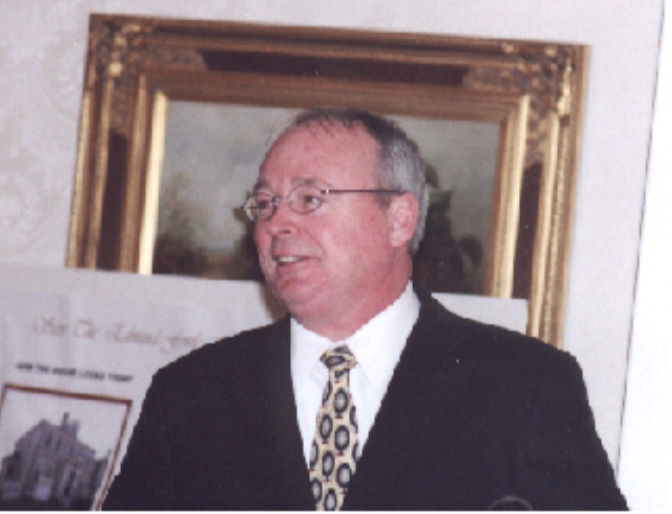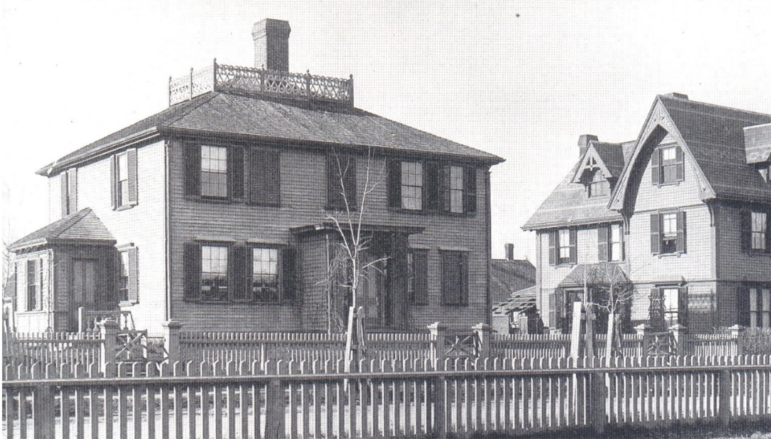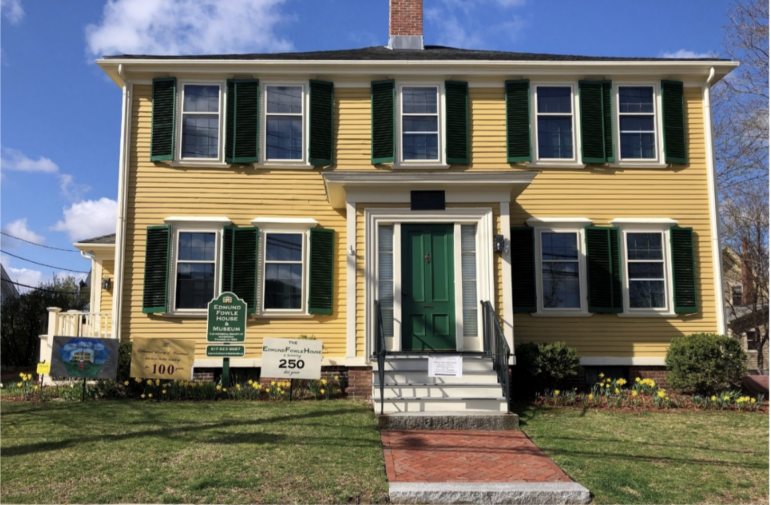
The following piece is part of a series on local history provided by the Historical Society of Watertown. The speech was written by Paul Brennan, former President and former Vice President of the Historical Society. He wrote it for a reception held to honor Senator Steve Tolman. It was published in the April 2005 Historical Society newsletter, “The Town Crier.” When Paul was President, he lived in the Fowle House for 5 years starting in 1988 and in December 2000 was named the “Town Historian” by the Town Council.
On February 15, 2005 the Historical Society of Watertown publicly acknowledged and thanked State Senator Steve Tolman for his successful efforts in obtaining funding for the restoration and preservation of the historic Edmund Fowle House.
A reception was held at the Commander’s Mansion on the Arsenal Property and was attended by approximately 75 people. This event was organized by Historical Society Council Members and Building Restoration Committee (BRC) members Richard Najarian and Jim Bean. Former Historical Society President and BRC Member Paul Brennan was asked to speak about the Edmund Fowle House and its history. Mr. Brennan is also Watertown’s Town Historian. His speech is included here:
THANK YOU, SENATOR STEVEN TOLMAN
Before this evening, we used to think about the Edmund Fowle House in three different
ways: about the Fowle family, about Charles Brigham, and about the Historical Society of
Watertown. However, after this evening there will be a fourth way we now think about this
national treasure thanks to our special guest of honor.
The Fowle house begins with Edmund Fowle “the Cordwainer”. He was a local kid who
grew up in Watertown, started a small business, went to church, married another local kid, raised
a family, and passed on after a good life. One of their children would later reside in this home
and then a third generation would do the same. For over one hundred years, the Fowle family
would make Watertown their home, live in this house, work the land, do their civic duties, raise their children, and participate in the social and business community of this town. The Fowle
family was very much a typical Watertown family.
But during the time of their second generation’s residence (Edmund Fowle II), something extraordinary happened that would change this family, this town and the province it laid within forever. A new nation would form, the United States of America, and this family would avail themselves in every imaginable way, to this new state and (in many ways) this new nation. It used to be common knowledge that Watertown was once the capital of the new State of Massachusetts Bay.
It used to be common knowledge that the house of the Fowle family was the place where the first acting Governor (the Governor’s Council) met before, during, and after the formation of this world’s newest nation.
It used to be common knowledge that Dr. Benjamin Church was tried and convicted here for treason and that Henry Knox drove his cannon train through these streets and that George Washington met here regularly with the rebellious Legislature, and it used to be common knowledge that the first treaty of the United States of America was signed here.
That’s why when Charles Brigham bought this house from the heirs of the Fowle family; he knew what it represented to Watertown.
Charles Brigham was a very famous architect and you see evidence of his work all over this town, this state and throughout this country. And rather than raze this building in 1871, when Mt. Auburn Street was being widened, he moved the house out of the path of destruction and allowed it to blend into the new neighborhood it still sits within to this very day.

Charles Brigham was part of this country’s Victorian age and he too was a local kid … did pretty well for himself too. He knew that, “what was once common knowledge about our great little Watertown” was fast being forgotten, and a few years before his death in 1925, rather than let the Fowle house be absorbed by a shadow of ignorance, he sold the building to an organization he himself helped to found, The Historical Society of Watertown
The Historical Society of Watertown was begun in 1888 with the self-declared purpose of expanding an appreciation and knowledge of all things historical in nature about this ancient community. The acquisition of the Fowle House was the jewel in the Society’s crown and their dream to have a museum, library, and art gallery (dedicated to all the things great and small about Watertown) had just been realized.
The Historical Society received this house just before two other extraordinary things would take place in this country, the birth of the historical preservation movement and the Great depression.
As much as the Society wanted to be a leader in historical preservation within the Commonwealth, it realized that it would now need to take a more conservative approach. It wasn’t until 1988, about 216 years after the building of this house, and 212 years after the founding of this state and nation, and 117 years after the house was moved out of harm’s way, 100 years exactly after the founding of the Historical Society, and 66 years after the society became the caretakers of this national landmark, that the building finally becomes poised to serve as a permanent reminder of the great things that actually happened in our community.
I say poised because it would eventually be another 16 years later before a very distinguished gentleman, the one we are here to honor tonight, would seize an opportunity to finally help the society realize their dreams of restoring the Edmund Fowle House for everyone to enjoy and learn from.
This will be the final Our History piece. If you would like to continue to read stories like these in their newsletter about the history of Watertown, you can become a member of the Historical Society at http://www.HistoricalSocietyofWatertownMA.org or contact Joyce at joycekel@aol.com

I really appreciate the posting of Watertown history.
It is good to know, in physical detail how people before us lived and thought.
Really, where would we be without them.
The reflections of times past can give energy for the patience we often need to navigate the present.
Someone actually lived in the house as recently as 2000?
Wow.
David,
The last person living in the house was a caretaker, and he left in 1994.
I’m happy to hear that you have enjoyed reading these Historical Society articles.